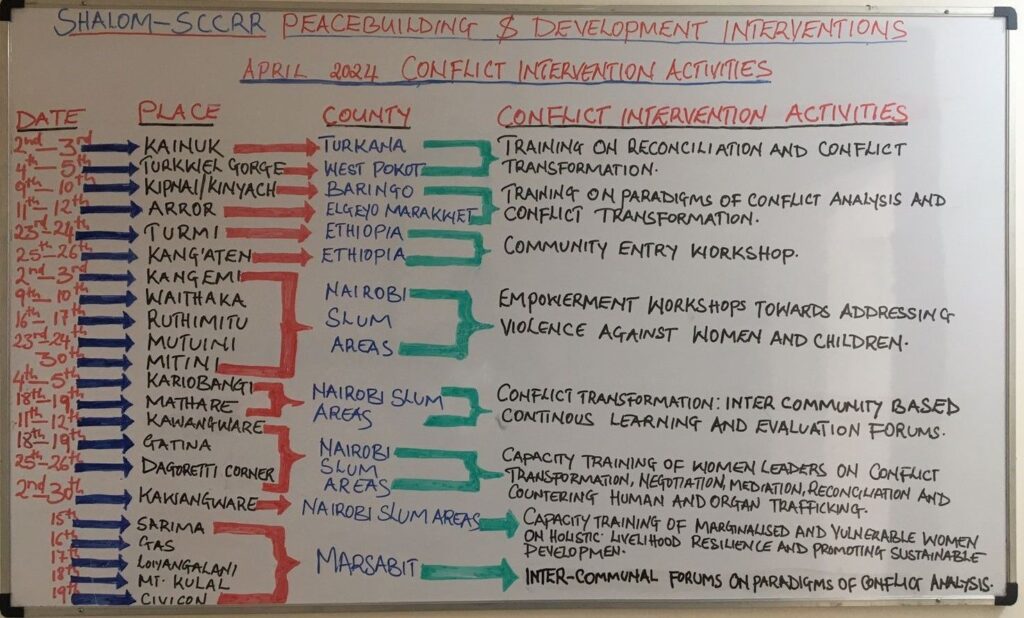The Ilemi Triangle has witnessed persistent violent inter-ethnic conflicts among pastoralist groups living in this area. These conflicts are frequently on the surface caused by competition for scarce resources (water and pasture), revenge, and the desire to accumulate more livestock, which constitutes the lifeline of the pastoralist communities. However, the main underlying cause of conflicts in this area is lack of vital institutions that can provide basic needs and services to the local communities. The forage rich Triangle belt was and still remains essential for the survival of the pastoralist Turkana (of Kenya), Toposa (of South Sudan), Nyang’atom and Merille (of Ethiopia) communities, hence worth dying for. In this area, the painful cost of violent conflicts can be evidenced by deaths, injuries, increased poverty, counter raids and general disruption of socio-economic fabrics.
The past experiences have confirmed that the cost of violence among these communities is very high as compared to the cost of preventing the same. In retrospect, the violence that occurs in this area cannot only be predicted; it can also be prevented. After working in the area for the past four years, SCCRR was able to ascertain that although the local community had their own traditional CEW&ER systems, the systems are not effective enough in helping in the prevention of impending conflicts. This is because they are not well organized and the communication channels are not very clear hence their ineffectiveness. This, therefore, informed Shalom’s strategy of strengthening the already existing local CEW&ER systems in the Ilemi Triangle.

A Turkana Moran (warrior) explaining how the traditional Conflict Early Warning & Early response system works in the area.
In the month of February 2018, SCCRR’s team facilitated a Conflict Early Warning and Early Response (CEW&ER) workshops in the area particularly with Shalom’s Peace Groups in Kokuro and Todonyang’. The main aim of the workshops was to equip the selected key influential stakeholders with the knowledge and skills of CEW&ER to enable them to respond prudently to any looming conflict in their areas. In interactive sessions with these groups, the SCCRR’s team was able to guide the participants through simplified steps of CEW&ER that included the collection of conflict early warning signs, analysis of warning signs, dissemination of warning signs, and practical conflict prevention strategies.
With the enhanced knowledge and skills of CEW&ER, the participants were able to present better the basic traditional CEW&ER systems in their areas, how the systems actually work, their challenges and how the systems can be improved. Furthermore, the trained participants were also able to identify and prioritize conflict early warning signs that have been traditionally used in predicting looming conflicts between the Turkana community and their neighbouring pastoralist communities from both South Sudan and Ethiopia. The early warning signs identified by the participants through their ‘traditional or citizen science process’ included; enemy’s footprints found around the mobile villages (kraals) and grazing fields; signs gotten from reading of livestock’s intestines; prophesies by the traditional prophets (seers); strong unusual ‘dark’ wind; and, sudden migration and re-grouping of the ‘enemy’s’ camps or kraals adjacent to the border between the neighbouring communities.

A group photo of Todonyang’ Peace Group and SCCRR’s Team after the workshop.
At the end of the two workshops, SCCRR’s team together with the groups was able to establish simpler and working local CEW&ER systems in the two areas. The stakeholders and their different roles in these systems were identified; conflict early warning signs to be collected and analysed were prioritised; the process of disseminating early warning signs was agreed upon; and, the strategies for averting threatening conflicts were clearly stipulated. It was agreed that both the members of the Peace Groups and members of the larger community were to be involved in the operationalization and monitoring of the systems in the two places.
Given the historicity and negative impact of violent conflict among the pastoralist communities living in the Ilemi Triangle, the quest to adequately put in place preventive measures to possible violence in the Ilemi Triangle is of paramount importance to Shalom as an organization. Shalom is, therefore, committed in working with the communities to put practical strategies in place to curb looming conflicts that have always endangered the lives of the people in this area.
Authors: Paulson Erot, M.A.,B.A.; Assistant Program Manager (Peacebuilding Program)
Arthur Magero, M.A., B.A.; Program Officer (Peace Education)

